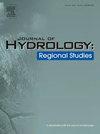Using reanalysis precipitation data for developing intensity-duration-frequency curves in a poorly gauged city
IF 4.7
2区 地球科学
Q1 WATER RESOURCES
引用次数: 0
Abstract
Study region
The Msimbazi River catchment traversing Dar es Salaam city in east-central Tanzania.
Study focus
The lack of high-resolution rainfall data in cities in developing countries hinders the development of suitable intensity–duration–frequency (IDF) curves for designing and evaluating hydraulic structures. Thus, this study investigated the potential of relatively high-resolution reanalysis precipitation data for developing IDF curves in the poorly gauged Msimbazi River catchment in Dar es Salaam city. The time series of hourly ERA5-Land reanalysis precipitation data were used to generate the annual maximum series at four selected points in the river catchment. These were subsequently bias-corrected using parameters derived from limited observed rainfall data. The bias-corrected annual maximum series of reanalysis precipitation (AMSRP) data were fitted with the best probability distribution functions, which were then used to estimate quantiles of IDF curves for various annual exceedance probabilities.
New hydrological insights
The findings revealed that uncorrected AMSRP data would have underestimated rainfall intensities in this region by a factor of two to six. Different areas in the Msimbazi River catchment have different rainfall distributions and IDF curves. Thus, no single set of IDF curves can represent rainfall intensities in the entire river catchment. Due to the potential of relatively high-resolution reanalysis precipitation data, designs and evaluations of hydraulic structures in poorly gauged cities are encouraged to use bias-corrected and location-specific IDF curves.
利用再分析降水量数据绘制一个测量条件较差城市的降水强度-持续时间-频率曲线
研究区域横穿坦桑尼亚中东部达累斯萨拉姆市的 Msimbazi 河集水区。研究重点发展中国家的城市缺乏高分辨率的降雨量数据,这阻碍了设计和评估水力结构所需的合适的强度-持续时间-频率(IDF)曲线的开发。因此,本研究调查了相对高分辨率的再分析降水数据在达累斯萨拉姆市测量条件较差的姆辛巴齐河流域开发 IDF 曲线的潜力。每小时ERA5-Land再分析降水量数据的时间序列被用于生成该流域四个选定点的年最大降水量序列。随后,利用从有限的观测降雨数据中得出的参数对这些数据进行了偏差校正。经过偏差校正的再分析年最大降水量序列(AMSRP)数据采用最佳概率分布函数拟合,然后用于估算各种年超标概率的 IDF 曲线定量。姆辛巴齐河流域的不同地区有不同的降雨分布和 IDF 曲线。因此,没有一组 IDF 曲线可以代表整个流域的降雨强度。由于相对高分辨率的再分析降水数据的潜力,我们鼓励在测量条件较差的城市进行水力结构设计和评估时,使用经过偏差校正的、针对具体地点的 IDF 曲线。
本文章由计算机程序翻译,如有差异,请以英文原文为准。
求助全文
约1分钟内获得全文
求助全文
来源期刊

Journal of Hydrology-Regional Studies
Earth and Planetary Sciences-Earth and Planetary Sciences (miscellaneous)
CiteScore
6.70
自引率
8.50%
发文量
284
审稿时长
60 days
期刊介绍:
Journal of Hydrology: Regional Studies publishes original research papers enhancing the science of hydrology and aiming at region-specific problems, past and future conditions, analysis, review and solutions. The journal particularly welcomes research papers that deliver new insights into region-specific hydrological processes and responses to changing conditions, as well as contributions that incorporate interdisciplinarity and translational science.
 求助内容:
求助内容: 应助结果提醒方式:
应助结果提醒方式:


